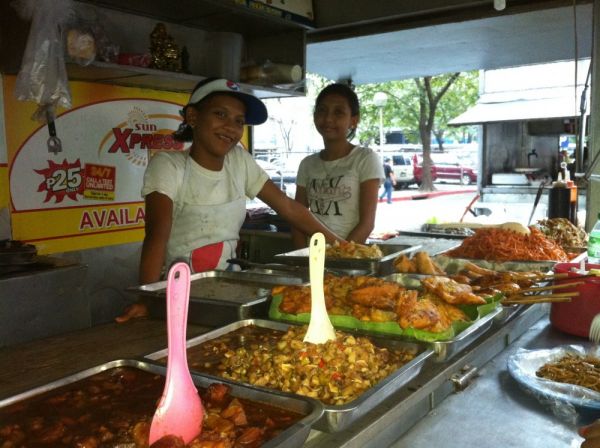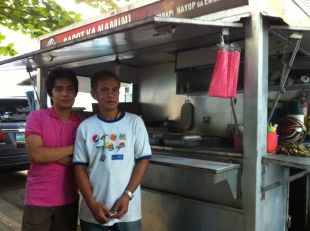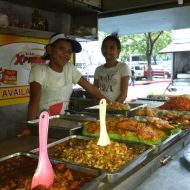Jolly Jeeps Transform a Food Desert Into Snack-Attack Heaven

Two of Marlene Asilo’s four employees, ready to serve. Photo credit: Purple Romero
For Marlene Asilo, it’s a family heirloom of sorts – a gray, aluminum food cart, one of the many “jolly jeeps” that line the busy streets of the business and financial hub that is Makati City.
“I inherited it,” says the 40-year-old Asilo as she fries banana fritters for her customers, many of them employees from the neighborhood’s banking firms, the men in well-pressed polos, the women in heels.
It was her father who got Asilo’s family into the food cart business back in 1971, when Metro Manila’s population was less than half of what it is today. Asilo remembers her dad’s first food cart was just that — a wheeled wooden cart from which he served breakfast, lunch and dinner on a street corner from dawn till dusk. Back then, most of his customers were laborers and blue-collar workers. But as the mobile units grew in popularity in the 1990s, office workers, starved for dining options in the city’s food desert of a business district, started lining up for the street food in droves. As the number of jolly jeeps exploded, they evolved from wooden carts into motorized food trucks, or jeepneys, as they’re called in the Philippines. (The name “jolly jeep” is an amalgam of jeepney and Jollibee, a popular Filipino fast-food chain).

Joselito Bartolome and his son Mark. Photo credit: Purple Romero
Asilo watched the evolution of the family business as her brother followed in her father’s footsteps. But she decided to become a computer programmer, and got a job with a large company in Makati City. She worked there for more than five years, often grabbing a midday snack at a jolly jeep herself. When the firm ran into financial trouble, however, she was one of the many layoffs. “All of my friends were from the same company and were let go,” she says. Asilo vowed at that moment that she would only work for herself from then on. Seeing her brother’s success, she dove head-first into the business and became a jolly jeep operator. That was ten years ago.
Now Asilo has her own employees – four workers who man the jolly jeep and help her prepare and sell food. She can do $400 USD in daily sales during the months leading up to December — her “peak season.” But for all its profitability, Asilo’s business remains vulnerable, like many informal enterprises, to the whims of fickle authorities and capricious laws.
Joselito Bartolome has been managing his jolly jeep for eight years and tells me that there was a period, for instance, when the city government tried to get rid of the rapidly multiplying food trucks. Jolly jeep owners were criticized for operating “eyesores” and not paying taxes – back then, Bartolome recalls, the most he paid to the city was a parking fee of $5 USD per day.
But the jeeps’ popularity forced the government to rethink its ban. Instead, jolly jeeps in Makati became licensed, regulated and subject to inspections, and now operate in the gray area between formal and informal. They’ve also, by law, become stationary kiosks – no more following the crowd. And the city’s relationship with its jolly jeeps seems to have steadied. Now the government’s website even boasts that its jolly jeeps “operate on a 24-hour basis for the benefit of call center employees and other night-shift workers in the city.”
Still, that doesn’t insulate jolly jeep operators from the changing urban landscape. When one of those call centers moved to another location last year, Bartolome’s daily sales plunged to $150 from $350 per day. And Asilo says they used to earn more when there were fewer restaurants in the area. The competition from other jolly jeeps has gotten stiffer, too, with everyone upping their game as the numbers increase. Today, there are 127 jolly jeeps across Makati City, most of them operating in the central business district. Bartolome is banking on the unique taste of his bestsellers – particularly the spicy Bicol Express – to retain his edge over the others.
Even if they don’t earn as much as they used to, both Asilo and Bartolome say they don’t see themselves ever going back to the formal economy. (Before buying his jolly jeep, Bartolome was a dance instructor for 28 years). And they don’t mind not having the health care or housing benefits that are usually provided to salaried employees. Asilo says it’s enough that she can send her five kids to school. Bartolome feels the same – his son’s university tuition was paid with the earnings from his jolly jeep. He has two more kids to send to school after that. This jeep is their college fund.
When asked if she will pass on the family heirloom to her children, however, Asilo says no. “It’s hard maintaining a jolly jeep,” she says, though she can’t see herself giving it up. She knows that even if she’s old, no one can stop her from selling food, and that the office workers of Makati City will never tire of cuisine from the street – especially hers.
Purple Romero is a Filipina multimedia reporter. Follow her on Twitter @purpleromeropo









